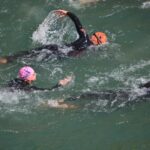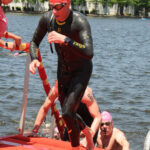Like all endurance sports, triathlon success involves preserving and apportioning out your energy evenly during a race. Burn too much gas early in a race and you’re finished before T2. Run out of gas late in the race and you have no fuel for a strong finish. In either case, you’re in for one horrendous sufferfest that keeps you from achieving your triathlon goals and sucks the fun out of racing triathlons. One of the best tools you have in your tri-toolbox for saving your energy is learning to staying relaxed before and during a triathlon. There are four places during a triathlon in which staying relaxed is especially important: before the start, early in the swim and bike, and late in the race.
Pre-Race
The greatest threat to staying relaxed and preserving your energy before your start is anxiety. The swim alone is anxiety provoking for most triathletes. You’re about to face a big physical and mental challenge. Most of the triathletes around you are nervous. Your heart is pounding, your adrenaline is pumping, you’re sweating, you’re worrying about the race, and you’re burning fuel that you can’t afford to lose.
Some triathletes make this anxiety worse by worrying about it (“Oh my gosh, I’m nervous. Maybe I’m not ready for this. What am I doing here?”) until they work themselves up into a full-blown panic attack. The first thing you want to do is realize that some pre-race anxiety is normal; everyone feels it to some degree. In psychology jargon, we call it “anticipatory arousal,” which means that your body is getting ready for a challenge. You want to make sure your pre-race anxiety doesn’t get out of hand and drain your fuel tank. You also want to take steps to relax yourself so you minimize your energy burn rate.
The most basic, yet most powerful, thing you can do to reduce your anxiety is breath. When you get nervous, your breathing system becomes constricted, your breaths become shorter and you get less oxygen into your system. As oxygen is essential for endurance sports, this is obviously not a good thing! As you go through your pre-race preparation, be aware of your breathing and consciously take slow, deep breaths on a regular basis. Also, keep your body moving. If you allow yourself to sit or stand still for too long, your muscles will tighten up. Walk around, stretch, shake out your arms and legs, anything to keep your blood flowing and your muscles relaxed. Another underappreciated tool for staying relaxed is to talk to people. By talking to your fellow competitors, you take your mind off the race and can share support and encouragement with each other.
The Swim
The next place staying relaxed is important is in the early stages of the swim. Just before the start of the swim, everybody’s anxiety increases, adrenaline is flowing, and there can be a tendency to go out too fast. That’s why it’s so common to see triathletes sprinting the first 200 yards of the swim and then having to slow down considerably to catch their breath. To keep from “cooking” yourself early in the race, just before the start take a few more deep breaths, then, when the horn goes off, focus on starting off with a smooth, relaxed, and consistent stroke at a pace that you want to maintain throughout the swim. You will still go out a bit faster than your normal pace, but you’ll settle in more quickly and you won’t burn too much fuel before the pack separates.
The Bike
Going out too fast and building up lactic acid early in the race can also happen right out of T1 on the bike. Because you’re probably thrilled to have gotten out of the water alive, your adrenaline is probably pumping again and, because it’s early in the race, you still have tons of energy. Just like the swim, there’s a tendency to put the hammer down and go out of T1 too hard. Of course, the problem is that you’ll burn tons of fuel in the process. As soon as you get on your bike, take a few deep breaths, settle your body down, focus on establishing a steady cadence and, most importantly, ignore the riders who may be flying by you (either they’re just faster than you or you’ll see them later in the race after they run out of gas).
The Run
The end of the race is where staying relax is most important. Once you’re well into the run, your two greatest enemies, fatigue and pain, show their ugly faces. At this point in the race, your body’s feeling threatened and it takes steps to protect itself by tensing up (think of a muscle cramp as a really loud plea from your body to stop!). Unfortunately, this tension actually increases fatigue, burns more fuel, and causes more pain. You can slow your energy drain and lessen the pain you feel by actively relaxing your body. Focusing on taking slow, deep breaths ensures that you get enough oxygen into your system and helps your muscles to relax. Checking your running posture, stride, and pace will help you be sure you’re running as efficiently and relaxed as possible. As your body braces itself, your shoulders and arms will tense, which not only increases fatigue and pain, but also raises your center of gravity and shortens your stride. To counter this reaction, you can shake out your arms and hands, and settle your shoulders. Finally, one of the most effective, and oddest, ways to relax in the face of fatigue and pain is to smile. Smiling releases endorphins which have a real relaxing effect on you. It also generates some positive thoughts and emotions which take your mind off the fatigue and pain you feel as you approach the finish.
All of these strategies will enable you to conserve your fuel throughout your race so you’ll have energy to burn at the end. While other triathletes are out of gas and slogging their way to the end, in the last few miles, you have the fuel to now put the hammer down and cross the finish line strong in a burst of energy.






